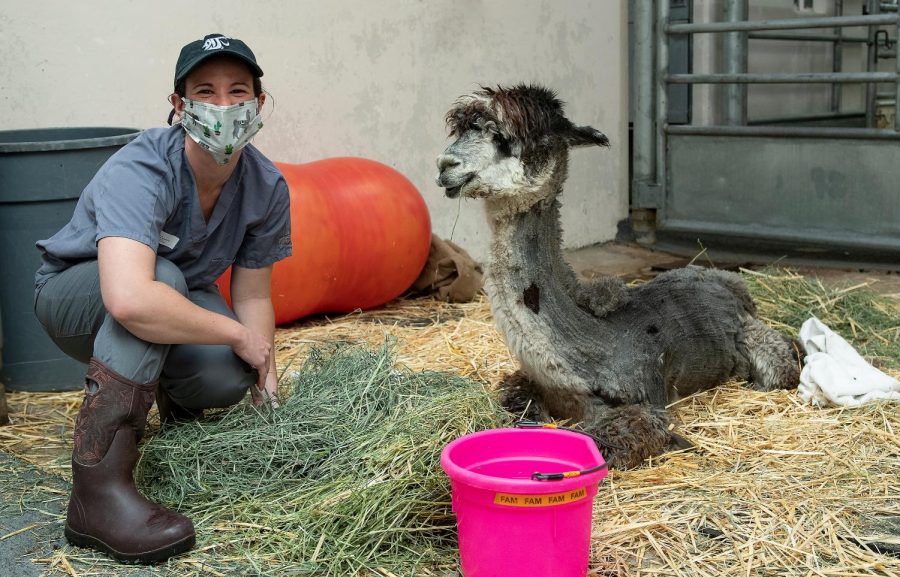Vet hospital adapts animal health care during pandemic
Most services are suspended, but vet hospital is still providing care for emergencies, urgent care
Photo courtesy of Shelly Hanks, WSU Photo Service
Dr. Catherine Krus, cares for “Rose,” a 3-year-old alpaca suffering with tick paralysis. The tick was located and removed from the dark spot on the neck.
April 23, 2020
The WSU Veterinary Teaching Hospital is the largest veterinary referral center in the Pacific Northwest and with COVID-19, the hospital is still open and finding ways to adapt and serve the animals of Whitman County.
Public Information Officer Charlie Powell said the hospital is providing care for emergency and urgent care cases. An emergency case is when an animal is going to lose its life or limb unless immediate care is provided. An urgent case is where the animal is sick or injured and needs definitive care, though not always initially. All elective procedures have been put on hold for the moment.
“A lot of the minimal types of things that can wait are being asked to wait,” Powell said.
Powell said the hospital is still maintaining its primary hours, 8 a.m. to 5 p.m. every weekday, and is still open 24 hours a day, but not fully staffed outside of its primary hours. Instead, many staff members come in to do rounds, attending to present patients, or come in on call. Powell said there are about a hundred staff in a day, whereas there usually would be a couple hundred at any given time.
Agricultural Animal intern Catherine Krus works in the Large Animal Hospital. She works in the hospital during the day, admitting any emergencies while she’s in and remains on call during the night. She said everyone in the staff makes sure they’re all staying as clean as possible and reducing the risk of disease.
She said students and clinicians used to take care of the animals overnight, but with the students having gone home, the agricultural animals and equine departments have had to combine and rotate through shifts. She also said springtime is usually a busy time for agricultural animal veterinarians.
Krus said she thinks people are a bit more hesitant to bring their animals in, not only due to risk but also because of the vet hospital’s policy with large animal emergencies. Owners must stay in their vehicle or stay outside, which can be stressful for owners worried about the state of their animals, she said.
“I think for a lot of people that’s challenging, but we make do with what we can,” Krus said. “Overall, the changes here are unfortunate but they are necessary and I think everyone is handling it as well as they can.”
Small Animal Internal Medicine Specialist Sarah Guess said she is mainly working from home, advising doctors still staffing the hospital and working with vets in the community on other cases. Guess said she usually focused on internal organ diseases such as lungs or liver, but with the restriction on non-emergency cases her caseload has gone down. She said the small animal department is seeing about a third of their usual amount of cases, and they’re focusing on keeping as few people in the hospital as possible and as many people on standby as possible.
“Our hospital has this culture of operating as a team,” Guess said. “We pitch in and jump in and do what needs to be done.”
Sanitation and hygiene are encouraged even more than usual. Powell said hands are being washed and surfaces cleaned, and in certain parts of the hospital they have mats with concentrated hydrogen peroxide to decontaminate shoes.
Powell said the hospital is also doing it’s best to accommodate people’s schedules and medical issues. Some staff have children or relatives at home and no one else to take care of them, or medical conditions that put them at higher risk for the disease.
“Some people have to go part-time, some people want more work because their spouse or significant other is out of work and they need the money,” Powell said. “The financial stresses, as well as the emotional stresses of working in the healthcare field, can be incredibly difficult to deal with.”
Besides that, Powell said there’s a pressure that comes with working under threat of disease which can cause anxiety or depression in workers. To help, the hospital has started doing Wellness Wednesdays, a set of recorded Zoom meetings on dealing with specific psychological and emotional issues.
“The ability to adapt in health care, whether it’s human or animal, is one of your primary assets. No day is the same as before,” Powell said.
Krus said she believes that as COVID-19 goes on, more people will transition to telemedicine, where owners meet with veterinarians over video call, as the best way to give advice without meeting in person. She also said if telemedicine does become more prevalent it might be useful even after COVID-19 is over.
Guess said she believes veterinarians have to be adaptable and regardless of what happens in the future, she and her team will be able to handle it.
“Our caseload has gone down but we’re still doing everything we can to make sure that pets and their owners are still getting the best care we can provide, within the limitations COVID has set for us,” Guess said.










